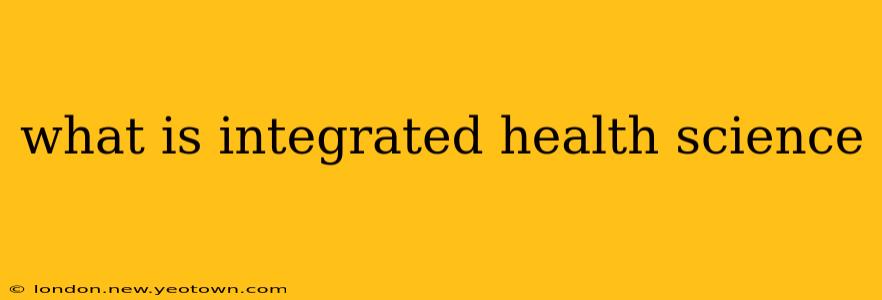What is Integrated Health Science? A Holistic Approach to Wellness
Imagine a world where your healthcare isn't compartmentalized, where your physical, mental, and emotional well-being are considered interconnected parts of a whole. That's the essence of integrated health science. It's not just about treating symptoms; it's about understanding the root causes of illness and promoting overall wellness through a holistic approach. This isn't a newfangled trend; it's a philosophy gaining momentum, emphasizing the interconnectedness of our bodies and minds.
Let's embark on a journey to unravel the complexities and benefits of this fascinating field.
What are the core principles of integrated health science?
Integrated health science rests on several key pillars:
-
Holistic Approach: It views the individual as a whole, considering their physical, mental, emotional, social, and spiritual aspects. This differs significantly from the traditional, often fragmented, medical approach which may focus solely on treating a specific ailment.
-
Patient-Centered Care: The patient is at the heart of the process. Their unique needs, preferences, and beliefs are respected and integrated into the treatment plan, making it truly personalized.
-
Evidence-Based Practice: While embracing alternative and complementary therapies, integrated health science relies on rigorous scientific evidence to support its interventions. It's about combining the best of conventional medicine with the wisdom of alternative approaches, all backed by research.
-
Collaboration: This approach emphasizes collaboration between different healthcare professionals, fostering a multidisciplinary team to provide comprehensive care. This might include doctors, nurses, therapists, nutritionists, and other specialists working together for a unified approach.
What types of therapies are used in integrated health science?
Integrated health science draws from a diverse range of therapies, bridging the gap between conventional and complementary approaches. Some common examples include:
-
Acupuncture: A traditional Chinese medicine technique involving the insertion of thin needles into specific points on the body to alleviate pain and promote healing.
-
Yoga and Tai Chi: Mind-body practices that combine physical postures, breathing techniques, and meditation to enhance physical and mental well-being.
-
Massage Therapy: Manipulation of soft tissues to relieve muscle tension, improve circulation, and reduce stress.
-
Nutrition Therapy: Focusing on the role of diet and nutrition in promoting health and preventing disease.
-
Mindfulness and Meditation: Practices that cultivate awareness and focus, reducing stress and improving mental clarity.
-
Cognitive Behavioral Therapy (CBT): A talking therapy focusing on changing negative thought patterns and behaviors.
How does integrated health science differ from conventional medicine?
The key difference lies in the approach. Conventional medicine often focuses on treating specific diseases or symptoms using pharmaceuticals and surgery. Integrated health science takes a broader view, aiming to address the underlying causes of illness and promote overall well-being through a holistic approach that includes the patient's entire lifestyle and well-being. It's not about replacing conventional medicine but complementing it, offering a more comprehensive and personalized approach to healthcare.
Is integrated health science right for me?
The suitability of integrated health science depends on individual needs and preferences. It's particularly beneficial for those seeking a more proactive and holistic approach to their health, looking to address underlying causes of illness, or wishing to incorporate complementary therapies to enhance their well-being. Always discuss any new treatment approach with your primary care physician to ensure it aligns with your existing health conditions and medications.
What are the benefits of integrated health science?
The potential benefits are numerous, including:
-
Improved overall health and well-being: By addressing multiple aspects of health, integrated health science can lead to significant improvements in physical, mental, and emotional well-being.
-
Reduced stress and anxiety: Mind-body practices and therapies can effectively manage stress and anxiety.
-
Improved pain management: A combination of conventional and complementary therapies can provide more effective pain relief.
-
Enhanced quality of life: A holistic approach can lead to a more fulfilling and satisfying life.
Integrated health science represents a paradigm shift in healthcare, emphasizing a patient-centered, holistic approach that considers the interconnectedness of our well-being. While it offers tremendous potential, it's essential to consult with healthcare professionals to determine if this approach is suitable for your individual needs and circumstances. The journey towards wellness is a personalized one, and integrated health science provides a powerful framework for navigating this path.

